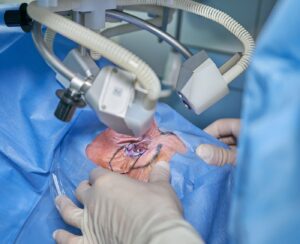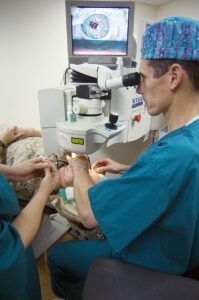Diabetic retinopathy is a serious eye condition that affects individuals with diabetes. It occurs when high blood sugar levels damage the blood vessels in the retina, leading to vision problems and potentially causing blindness if left untreated. While there are various treatment options available, laser eye surgery has emerged as an effective and popular solution for managing diabetic retinopathy. In this article, we will explore the benefits, procedure, recovery, and potential risks associated with laser eye surgery as a treatment for diabetic retinopathy.
Contents
- 1 Introduction to Diabetic Retinopathy
- 2 Understanding Laser Eye Surgery
- 3 Benefits of Laser Eye Surgery for Diabetic Retinopathy
- 4 Preparing for Laser Eye Surgery
- 5 The Laser Eye Surgery Procedure
- 6 Recovery and Post-Operative Care
- 7 Success Rates and Potential Risks
- 8 Alternative Treatments for Diabetic Retinopathy
- 9 Conclusion
Introduction to Diabetic Retinopathy
Diabetic retinopathy is a progressive condition that primarily affects individuals who have diabetes. Over time, the persistently high levels of sugar in the blood can lead to damage in the tiny blood vessels of the retina, the light-sensitive tissue at the back of the eye. As the condition progresses, these blood vessels may leak or become blocked, causing vision impairment and potentially leading to blindness.
Understanding Laser Eye Surgery

Laser eye surgery, also known as photocoagulation, is a minimally invasive procedure that uses focused laser beams to treat various eye conditions, including diabetic retinopathy.
The laser is directed at the damaged blood vessels in the retina, sealing off the leaks or preventing further growth. This targeted approach helps preserve healthy tissue and promotes the regeneration of new blood vessels.
Benefits of Laser Eye Surgery for Diabetic Retinopathy
- Preservation of Vision: Laser eye surgery aims to slow down or halt the progression of diabetic retinopathy, thus preserving the patient’s vision.
- Minimal Discomfort: The procedure is usually performed on an outpatient basis and involves only local anesthesia, ensuring minimal discomfort for the patient.
- Quick and Convenient: Laser eye surgery is a relatively quick procedure, typically lasting around 15-30 minutes per eye. It requires little downtime, allowing patients to resume their daily activities shortly after the surgery.
- Reduced Dependence on Medication: For individuals with diabetic retinopathy, laser eye surgery can help reduce the need for ongoing medication treatments, such as injections into the eye.
- Long-Term Results: The effects of laser eye surgery for diabetic retinopathy can be long-lasting, providing patients with improved vision for an extended period.
Preparing for Laser Eye Surgery

. If you’re preparing for laser eye surgery, here are some steps you can take to ensure a successful procedure and smooth recovery:
- Consultation: Schedule a consultation with a qualified ophthalmologist or refractive surgeon. They will evaluate your eyes, discuss your medical history, and determine if you are a suitable candidate for laser eye surgery.
- Choose a reputable surgeon: Research and choose a reputable surgeon who has experience in performing laser eye surgery. Check their credentials, read patient reviews, and consider getting recommendations from trusted sources.
- Understand the procedure: Educate yourself about the laser eye surgery procedure, including the different techniques available, the risks and benefits, and the expected outcomes. Ask your surgeon any questions you have to clarify your doubts.
- Follow pre-surgery instructions: Your surgeon will provide you with specific pre-surgery instructions, such as avoiding contact lenses for a certain period before the surgery, discontinuing certain medications, and fasting before the procedure. Follow these instructions carefully to ensure the best results.
- Arrange transportation: Laser eye surgery is typically an outpatient procedure, but your vision may be blurry or compromised immediately after the surgery. Arrange for someone to drive you home after the procedure to ensure your safety.
- Arrange for time off: Plan to take a few days off work or other responsibilities to allow yourself time to rest and recover following the surgery. It’s essential to give your eyes time to heal and adjust to the changes.
The Laser Eye Surgery Procedure
- Anesthetic Administration: Before the procedure begins, the eye will be numbed with local anesthesia to minimize any potential discomfort.
- Stabilizing the Eye: The ophthalmologist will use a specialized device to keep the eye steady during the surgery, ensuring precise targeting of the affected areas.
- Laser Treatment: A high-intensity laser beam will be directed at the damaged blood vessels in the retina, causing them to shrink, seal off, or regress.
- Multiple Sessions: Depending on the severity of the condition, multiple laser sessions may be required to effectively treat diabetic retinopathy. These sessions are usually spaced apart to allow for proper healing and assessment of progress.
Recovery and Post-Operative Care

Following laser eye surgery for diabetic retinopathy, patients may experience some mild discomfort or redness in the treated eye. It is essential to follow the ophthalmologist’s instructions for proper post-operative care, which may include:
- Eye Drops: Prescription eye drops will be provided to prevent infection, reduce inflammation, and promote healing.
- Avoiding Strain: Patients should avoid strenuous activities, heavy lifting, or any activities that may put pressure on the eyes during the initial recovery period.
- Regular Follow-ups: Scheduled follow-up visits with the ophthalmologist are crucial to monitor the progress of the treatment and ensure optimal healing.
It is important to note that individual recovery experiences may vary. While some individuals may experience immediate improvements in their vision, others may require several weeks to notice significant changes. The ophthalmologist will guide the expected recovery timeline based on the specific case.
Success Rates and Potential Risks
Laser eye surgery for diabetic retinopathy has shown promising results in managing the condition and preserving vision. However, it is essential to understand the potential risks and limitations associated with the procedure. Some of the risks include:
- Temporary Vision Changes: In some cases, patients may experience temporary vision changes, such as blurred vision or increased sensitivity to light. These usually resolve within a few days or weeks.
- Incomplete Treatment: Laser eye surgery may not be effective in all cases, especially if the condition is advanced or if there are other underlying eye complications.
- Recurrence: While laser treatment can initially address diabetic retinopathy, there is a possibility of the condition recurring over time. Regular eye examinations and proper diabetes management are essential to monitor and control the progression of the disease.
The ophthalmologist will discuss the potential risks and benefits specific to the individual’s situation and provide personalized recommendations.
Alternative Treatments for Diabetic Retinopathy
Apart from laser eye surgery, there are alternative treatment options available for managing diabetic retinopathy, including:
- Anti-VEGF Injections: These injections help reduce the growth of abnormal blood vessels in the retina by blocking the vascular endothelial growth factor (VEGF) responsible for their formation.
- Steroid Injections: Corticosteroid injections into the eye can help reduce inflammation and control the progression of diabetic retinopathy.
- Vitrectomy: In advanced cases, a vitrectomy may be performed to remove the gel-like substance (vitreous) from the center of the eye and replace it with a clear solution.
The choice of treatment depends on various factors, including the stage and severity of diabetic retinopathy, the patient’s overall health, and their preferences. The ophthalmologist will discuss these alternatives and guide the patient in making an informed decision.
Conclusion
Laser eye surgery has emerged as a valuable treatment option for managing diabetic retinopathy. With its ability to target the damaged blood vessels in the retina, laser therapy can slow down or halt the progression of the condition, preserving vision and reducing dependence on medication. However, it is essential to understand that laser eye surgery may not be suitable for everyone, and there are potential risks and limitations to consider. Consulting with an experienced ophthalmologist and following proper post-operative care is crucial for the best possible outcomes.
LASIK eye surgery is a safe 10-minute procedure to help you get rid of glasses. EyeMantra offers the most advanced LASIK options including PRK, Femto Lasik, SMILE surgery, Standard LASIK, ICL, and Contoura vision. If you have any questions on Lasik surgery in Delhi, Lasik surgery cost, and Lasik procedure, call us at 9711116605 or email at [email protected].


